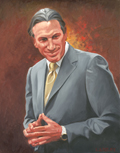Howard Schultz
Chairman, President & CEO of Starbucks Coffee Company
 Howard Schultz wasn't the first person to be carried away by the aroma of a well-roasted coffee bean. But the Starbucks Coffee Company leader was undoubtedly the first to turn that reverie into a billion-dollar retail operation. Howard Schultz wasn't the first person to be carried away by the aroma of a well-roasted coffee bean. But the Starbucks Coffee Company leader was undoubtedly the first to turn that reverie into a billion-dollar retail operation. Schultz's adventure started in 1981 when he traveled from New York to Seattle to check out a popular coffee-bean store called Starbucks that had been buying many of the Hammarplast Swedish drip coffee makers he was selling. There was that great smell, sure, but what caused him to fall in love with the business was the care the Starbucks owners put into choosing and roasting the beans. He also was impressed with the owners' dedication to educating the public about the wonders of coffee connoisseurship. "I walked away saying, ‘God, what a great company, what a great city. I'd love to be a part of that,'" Schultz said. Schultz was born in 1954 and raised in a Brooklyn, N.Y. housing project. A football scholarship to Northern Michigan University was his ticket out, and upon graduation, he worked a variety of jobs until becoming manager of U.S. operations for Hammarplast. It took Schultz a year to convince the Starbucks owners to hire him. When they finally made him director of marketing and operations in 1982, he had another epiphany. This one occurred in Italy, where Schultz took note of the coffee bars that existed on practically every block. He learned that they served not only excellent espresso, but the bars also served as meeting places or public squares—they were a big part of Italy's societal glue, and there were 200,000 of them in the country. But back in Seattle, the Starbucks owners resisted Schultz's plans to serve coffee in the stores, saying they didn't want to get into the restaurant business. Frustrated, Schultz quit and started his own coffee-bar business, called Il Giornale. It was successful, and a year later Schultz bought Starbucks for $3.8 million. As the company rapidly began to expand in the 1990s, Schultz always said that his main goal was "to serve a great cup of coffee." But attached to this goal was a principle: Schultz said he wanted "to build a company with soul." These goals led to a series of practices that were unprecedented in retail. Schultz insisted that all employees working at least 20 hours a week get comprehensive health coverage, including coverage for domestic partners. Then he introduced an employee stock-option plan. These moves boosted loyalty and led to extremely low worker turnover, even though employee salaries were fairly low. Why was Schultz so generous? He remembers his father, who struggled mightily at low-paying jobs with little to show for it. "He was beaten down, he wasn't respected," Schultz said. "He had no health insurance, and he had no workers' compensation when he got hurt on the job." So with Starbucks, Schultz wanted to build the kind of company "that my father never got a chance to work for, in which people were respected." Schultz has said that his model for expanding Starbucks is McDonald's, with a few key differences. One is that Starbucks owns most of its stores. Schultz doesn't believe it's possible to build a strong brand around franchises, although McDonald's is an obvious exception. Another difference is that Starbucks has managed to blossom without national advertising. Finally, Starbucks sells premium products to a fairly upscale, urban clientele. Starbucks experienced astronomical expansion during the 1990s, going public in 1992 and growing at a rate of 25 percent to 30 percent per year. As of Schultz's 2007 induction into the Hospitality Hall of Honor, Starbucks had more than 14,000 stores in 42 countries and had become one of the most recognized and respected brands in the world. But Schultz believes that the Starbucks story is just getting started. When asked the secret of his success, Schultz recounts four principles: "Don't be threatened by people smarter than you. Compromise anything but your core values. Seek to renew yourself even when you are hitting home runs. And everything matters." |